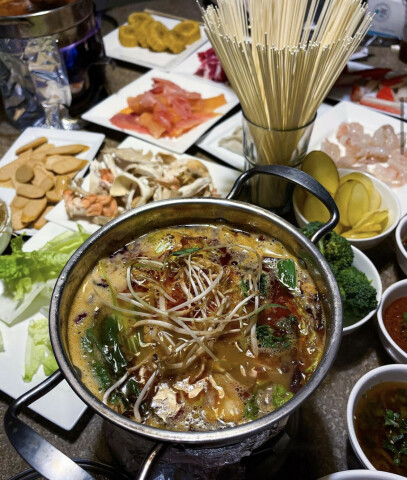2022 — the year we couldn’t get over hot pot
You talk to any restaurant owner in Karachi and they’d tell you one thing — customers in Karachi ain’t loyal. Food trends with staying power end up becoming fads. Fro-yo, DIY kits, tres leches and molten lava all had a show-stopping moment in Karachi so grand, it would have fooled anyone into thinking their appeal would last forever. Oh, well.
Hot pot in Karachi though — another food trend people thought would just be a fad — crept up on us differently. It had been simmering under the scene at this dimly lit, if-you-know-you-know place called Wang Wang and then Covid happened. Indoor dining was banned, quite a few running restaurants shut shop and people assumed the worst for Wang Wang too.
However, the hot pot restaurant, which originally ran from a mezzanine floor that people in Karachi loved to describe as “shady”, had quietly decided to relocate. Just as Covid restrictions were easing, it appeared on the rooftop of a building on Khayaban-e-Tauheed.
And then, the hot pot trend blew up.

You see, the never-ending pandemic made people hungry not just for food but also for shared experiences and hot pot offered just that. While many restaurants in Karachi were struggling to bring people back to indoor dining, Wang Wang had a 40-minute wait if you wanted a table.
“Hot pot is interactive. It’s almost a form of entertainment,” says Mariam Fatima, co-owner of a new hot pot restaurant in Karachi called Soul Spice.
Known to have originated from East or Southeast Asian countries, hot pot is served as a simmering pot of broth that is accompanied by a selection of vegetables, seafood, meat and starches, like noodles and rice. Diners are then expected to cook their chosen ingredients in the broth and assemble their servings in a bowl which they can also later top with dipping sauces.
“It’s a spectacular family food, as long as the person cooking knows what they are doing,” says Aisha Shirvanee, an undergraduate student in Karachi.

That’s one other thing that sets hot pot apart from other food trends — there is a learning curve involved. You might leave the meat in the broth for too long, you might undercook the dumplings, or you might overestimate the need for bok choy — all of which would deliver an underwhelming final product but it would be no one’s fault but your own.
“That’s key,” says Haroon Sheikh, co-owner of a popular hot pot restaurant called Totoro. “I suggest: ask for assistance. We don’t want to just sell hot pot. We want you to have a good experience.”

However, the learning curve and the effort of making it yourself is also one of the reasons why some people have stayed away.
Sameet Alam Khan, a personal trainer and a hot pot denier, says, “I have never even gone because I just do not like the idea that I will be paying a decent amount of money just to cook the food myself. I’d rather go have Chinese food.”

Amal Hamid, an avid reader who has given hot pot a fair chance, shares the same sentiment. “I just do not get the obsession. Anytime we talk about going out to eat, my friends only suggest hot pot.”
It might be this obsession, however, that has ensured that more hot pot restaurants open in Karachi this year than any other kind. We saw Golden Dragon open on January 25 this year, Totoro on February 1, Laowang on July 1, Shaolin, Hot Pot Tonight and Ming Zhu in October and many, many others popping up as well.
The appeal of hot pot, aside from the fact that it is a communal food, shares Sheikh, lies in the fact that the flavours are actually close to Chinese food. “It’s something people were already familiar with.”
“It is also not boring,” he insists. “You won’t see anyone on their phones when they are having hot pot.”

“Yes, you have to cook it yourself,” says Sheikh. “But it’s the same thing with cheese fondue. You don’t say, ‘oh I’m dipping into it myself’. It’s an experience.”
However, in the face of so much competition, how does a hot pot restaurant then stand out? Both Fatima and Sheikh who opened their own respective restaurants this year insist that making the broth from scratch is the answer.
“People here think hot pot is just Schezwan or it just has to be numbingly spicy,” says the Totoro co-owner. “We make our broth with pure chicken and don’t just mix the sauce pack with water. It is a six-hour slow cooked broth.”
Interestingly, Fatima shares that she didn’t like hot pot when she first tried it and so when she recreated the broth recipe for herself, she made it much lighter. “This is a broth you can keep on having. Older people can enjoy it too,” she says.

Soul Spice, Fatima’s hot pot restaurant that she co-owns with her mother, currently also offers a vegetarian broth — something she felt was missing from the market.
“It does not have to be pre-ordered. It is available on all days,” she says.
One thing’s for certain: The hot pot trend is not going away anytime soon. Most restaurants were running on capacity when it was sweltering hot and now that a slight chill has set in, people are bound to seek out even more hot pot. The menu additions that new restaurants are making to stand out are also pulling people in to try other cuisines.
Sheikh intends on building on the popularity of hot pot by also adding a Korean food menu. “Currently, we have a Korean food menu for catering but a restaurant is also in the works.”

Fatima has similar plans for her restaurant, while Ming Zhu, another hot pot restaurant has also become known for its Korean BBQ.
Could this be the beginning of another food trend? Only 2023 will tell.





Comments